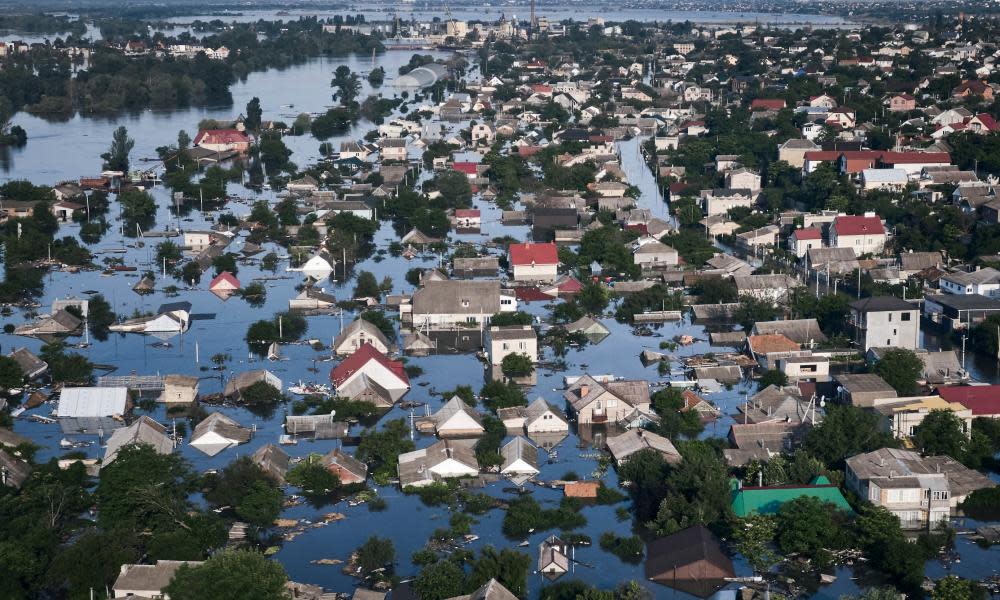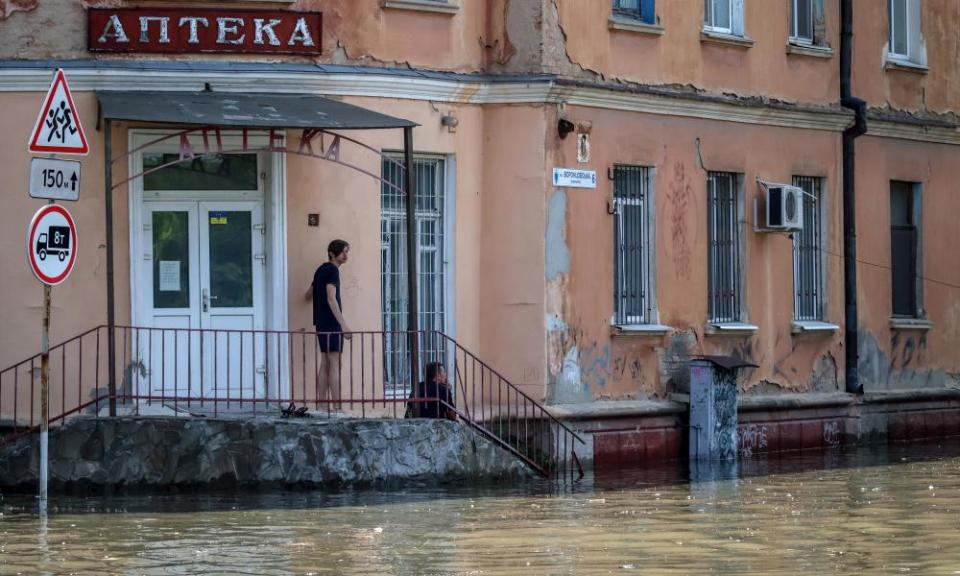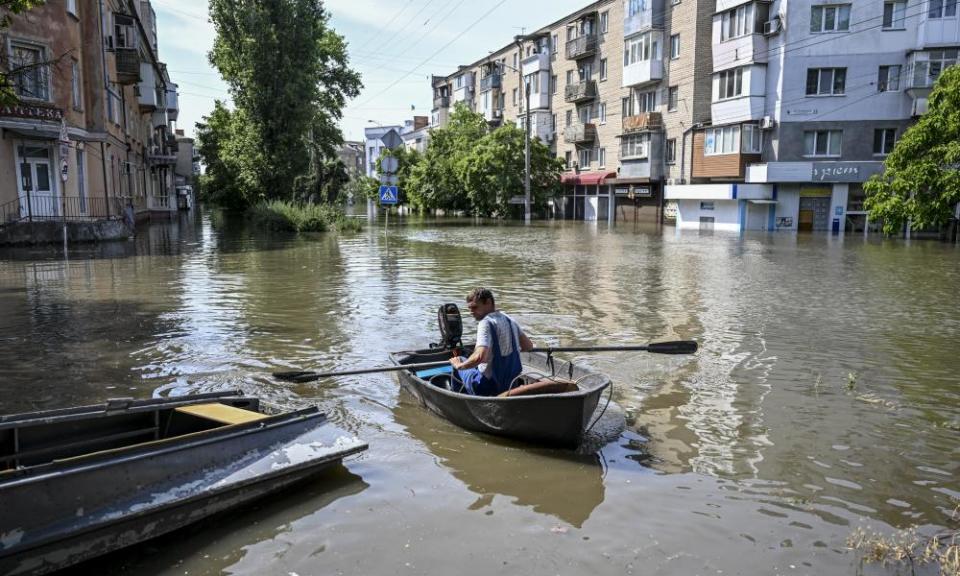Thursday briefing: The Kherson dam disaster has left thousands of Ukrainians adrift – and that’s just the start

Good morning. Two days after the destruction of Ukraine’s Nova Kakhovka dam led to widespread flooding, it’s clear that we are only beginning to appreciate the impact of what happened – and what it could mean for the environment, local agriculture and the course of the war.
At the heart of this story, however, are the people who live downstream on the Dnipro river, who have already endured months on the frontline and now find themselves living through a personal and environmental calamity.
The Guardian’s Dan Sabbagh is in Kherson, the biggest city to be affected; he spoke to me about the scene on the ground and its wider implications. First, the headlines.
Five big stories
UK news | Boris and Carrie Johnson hosted a close friend overnight at Chequers when a number of Covid restrictions were in place, the Guardian has been told. Johnson’s spokesperson said the stay was “entirely lawful” and sources close to him said Maloney was allowed to be there for childcare reasons at a time when Carrie Johnson was pregnant.
Immigration | A Guardian investigation has found that the Home Office has provided more than £3m in funding to Turkish border forces in the last year to prevent migrants reaching the UK. The Home Office has also supplied Turkish border forces, including the national police and the coastguard, with equipment and training.
Environment | The United Arab Emirates’s state oil company has been able to read emails to and from the Cop28 climate summit office, the Guardian revealed. The UAE is hosting the climate summit in November and its president, Sultan Al Jaber, is also chief executive of the Abu Dhabi National Oil Company. The revelations have been called “explosive” and a “scandal” by lawmakers.
Politics | Woking council, the most heavily indebted local authority in England, has declared it is effectively bankrupt after a risky investment spree involving hotels and skyscrapers by its former Conservative administration left it facing a £1.2bn deficit.
Media | The Daily and Sunday Telegraph are to be put up for sale after the Barclay family lost control of their crown jewel media assets in a bitter row with the newspaper group’s lender. Potential buyers include DMGT – the owner of the Daily Mail, Mail on Sunday, MailOnline, Metro and the i.
In depth: ‘We don’t know what the new landscape will look like’

Hundreds of thousands are without drinking water, according to Ukraine’s president, Volodymyr Zelenskiy. As many as 80 towns and villages and about 42,000 people are at risk. Landmines have been dislodged and are floating to unknown locations downstream, according to the Red Cross. Meanwhile the first reports of casualties have emerged, with at least three dead.
The destruction of the Nova Kakhovka dam is not confirmed to be Russia’s doing, although Zelenskiy has said he “does not understand” how anyone could doubt it, and some international observers agree (Moscow, for its part, blames Ukrainian “sabotage”). But there is no question its impact has been enormous.
“This is a huge crisis,” said Dan Sabbagh, the Guardian’s defence and security editor, who has been reporting from Ukraine since the beginning of the conflict, adding that there is “something elemental” about the scale of the flooding. “It’s just a massive river. We don’t know where the river boundary will end up. We don’t know what the new landscape will look like.”
***
How are people coping?
The water was still rising, though more slowly than before, when Dan spoke to me yesterday from central Kherson. He was standing at a crossroads that ordinarily would be hundreds of metres from the riverbank; instead, he said, the kerb had become “quite a busy little port” as rescue boats came and went.
For eight months last year, Kherson was occupied by Russian forces; parts of it have been heavily damaged by shelling and many people had already left the city by the time the floods hit. “Younger people tend to get out as fast as they can,” said Dan. “The residents who have stayed on are mostly older, and have point blank refused to go.”
For many of those who remained, though, the flooding has forced them out of the homes they resolutely refused to quit. As we spoke, Dan described an inflatable dinghy arriving, carrying a woman in her 70s and an older man who was unable to walk, who had been rescued along with “the obligatory dog”. A basket of five brown cats had been brought in a little earlier; in the background a dog was barking.
“There are a lot of abandoned pets – you see them everywhere. It’s just a feature of a war zone.”
***
What about the wider impacts?

Alongside the thousands of homes and lives casually ruined, there are warnings of large scale consequences elsewhere in the region.
Zelenskiy called the flooding “an environmental bomb of mass destruction”, and Kyiv has said this is Europe’s biggest ecological catastrophe since Chornobyl (also in Ukraine) in 1986.
As well as the impact on wildlife, the country’s agriculture ministry has warned that the fields of southern Ukraine could “turn into deserts” by next year, as their irrigation relied on the now-drained reservoir. The collapse of Ukrainian agriculture could also have a significant impact on the global food market.
***
What happens next?
“The flood water is muddy, it’s full of detritus and organic material, it’s got some of that iridescent sheen of oil on it,” said Dan. “It’s going through sewage facilities, cemeteries. It is fundamentally unclean. You know that it is going to be a smelly, grubby, disgusting mess when it comes to cleaning up.”
Overall, he said, “the legacy of this will be with us for a long time. At this stage, we’ve moved past the initial shock into the practical phase, and only later we will see all of the impacts and the environmental changes. We’re right at the beginning of this.”
Despite the scale of the floods, however, Dan said we should not underestimate the resilience of the Ukrainian people. Two women in their 50s or 60s, who were watching the rescue efforts, told him they would not leave their apartments, though the ground floor of their block was already inundated.
“I have seen this many times. The determination and resilience of people here is extraordinary. Those women have no intention of moving. And in one sense, I am confident that people will get through this.”
What else we’ve been reading
Don’t ask why Sky News hired a Prince Harry lookalike (who looks nothing like him) to read out bits of his court transcript on television. Don’t think about why the actor is standing in the middle of a studio, reading from a lectern. Instead, Stuart Heritage encourages us to banish all critical thinking skills when it comes to this bizarre piece of TV and just strap in and enjoy the absurdity. Nimo
“This is me now,” Mary Portas tells Paula Cocozza – no longer a redhead, it turns out, and not trying to help retailers sell more stuff either. Instead, she says, we need a new “kindness economy”. Esther
It seems there is nary a charting single nowadays that does not ransack anthems from the 90s and 2000s. Shaad D’Souza asks why so few pop songs feel original, and whether the industry is rapidly running out of ideas. Nimo
Think TV is awesome at the minute? Actually, it’s screwed. This gripping, deeply reported piece from Vulture on the broken economics of the streaming model – described by one insider as “the world’s biggest Ponzi scheme” – is well worth setting aside some time for. Esther
Sonya Singh takes a look at the hospital-based violence intervention programmes for victims of gun violence, and how they redirect people away from retaliation, and toward the services they need to rebuild their lives. Nimo
Sport

Football | Real Madrid have finalised a deal for Borussia Dortmund and England midfielder Jude Bellingham for €100m (£86m) plus add-ons. Bellingham, 19, will have a medical before sealing the transfer on a six-year contract.
Football | West Ham won their first major trophy in 43 years after beating Fiorentina 2-1 in the Europa Conference League final. Jarrod Bowen scored the winner in the 90th minute, sparking wild scenes at the Eden Arena in Prague. West Ham’s manager, David Moyes, was delighted to win the first major trophy of his career.
Formula One | Two Sky commentators have been suspended after they made a series of sexist remarks during an on-air post-race analysis of the Spanish Grand Prix on Sunday. Matteo Bobbi and Davide Valsecchi made sexist comments about a woman in the background, with Bobbi referring to her as an “upgrade package”, inviting Valsecchi to look behind him.
The front pages
“Pressure on Johnson after friend’s Chequers stay during Covid curbs” – the Guardian’s print lead today. The Times has “Sunak ready to approve Johnson’s honours list” while the Daily Telegraph splashes with “Sunak to tell Biden UK can lead on AI”. “Energy firms face customer payouts over ‘secret’ fees” says the i, while the Metro has the headline “Harry ‘car tracker’ bombshell”, under the banner “Prince in witness box day 2”. The Daily Mail is happy today – “At long last! Police are turning up to ALL home burglaries” – and gives itself credit. “Bet Lynch shock … Corrie Julie’s dementia heartache” says the Daily Mirror, and the Sun has that story on page one as well. Top story in the Financial Times is “US Treasury’s $1tn borrowing spree set to increase strain on bank system”. “Airport strikes threaten ‘summer of strife’” warns the Daily Express.
Today in Focus

The destruction of the Kakhovka dam
The UN has blamed the destruction of the Kakhovka dam on Russia. What impact will the flooding have on the war in Ukraine? Dan Sabbagh reports
Cartoon of the day | Steve Bell
The Upside
A bit of good news to remind you that the world’s not all bad
Brothers Amit and Abhishek Jain have spent the past five years rescuing sick and injured birds in Delhi in an initiative that has already saved an estimated 50,000 of them.
The pair poured their own earnings into their project, adapting a motorbike into their now-distinctive bird ambulance. It all started with a chance encounter in 2018 on their daily commute to work where they saw a helpless bird entangled by its wing, dangling from a branch. After calling the local fire service, the bird was eventually rescued but they decided they wanted to do more.
“Initially, it was just the two of us, but as word spread, people from all walks of life joined us,” says Amit. The brothers are also pushing for better facilities like fully functional avian and animal hospitals and more public awareness of the vital role trees play in bird habitats.
Sign up here for a weekly roundup of The Upside, sent to you every Sunday
Bored at work?
And finally, the Guardian’s puzzles are here to keep you entertained throughout the day – with plenty more on the Guardian’s Puzzles app for iOS and Android. Until tomorrow.

 Yahoo News
Yahoo News 
